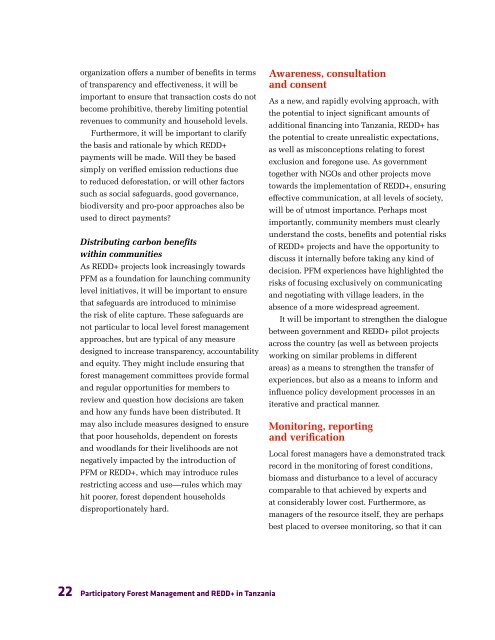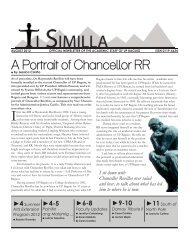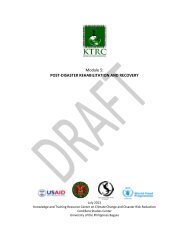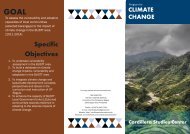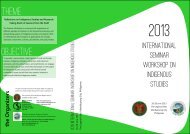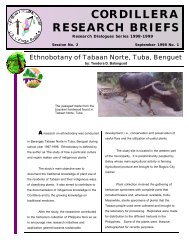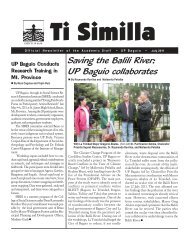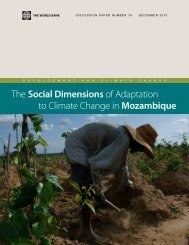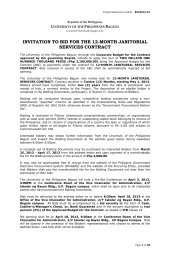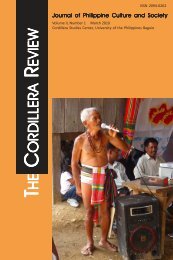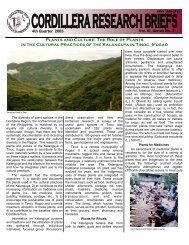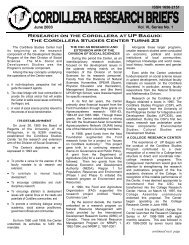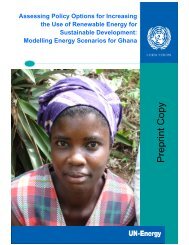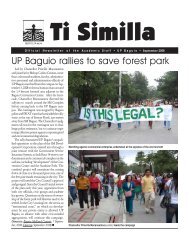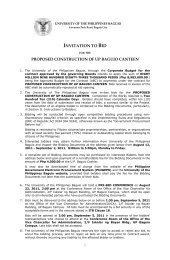Tanzania Report
Tanzania Report
Tanzania Report
You also want an ePaper? Increase the reach of your titles
YUMPU automatically turns print PDFs into web optimized ePapers that Google loves.
organization offers a number of benefits in terms<br />
of transparency and effectiveness, it will be<br />
important to ensure that transaction costs do not<br />
become prohibitive, thereby limiting potential<br />
revenues to community and household levels.<br />
Furthermore, it will be important to clarify<br />
the basis and rationale by which REDD+<br />
payments will be made. Will they be based<br />
simply on verified emission reductions due<br />
to reduced deforestation, or will other factors<br />
such as social safeguards, good governance,<br />
biodiversity and pro-poor approaches also be<br />
used to direct payments<br />
Distributing carbon benefits<br />
within communities<br />
As REDD+ projects look increasingly towards<br />
PFM as a foundation for launching community<br />
level initiatives, it will be important to ensure<br />
that safeguards are introduced to minimise<br />
the risk of elite capture. These safeguards are<br />
not particular to local level forest management<br />
approaches, but are typical of any measure<br />
designed to increase transparency, accountability<br />
and equity. They might include ensuring that<br />
forest management committees provide formal<br />
and regular opportunities for members to<br />
review and question how decisions are taken<br />
and how any funds have been distributed. It<br />
may also include measures designed to ensure<br />
that poor households, dependent on forests<br />
and woodlands for their livelihoods are not<br />
negatively impacted by the introduction of<br />
PFM or REDD+, which may introduce rules<br />
restricting access and use––rules which may<br />
hit poorer, forest dependent households<br />
disproportionately hard.<br />
Awareness, consultation<br />
and consent<br />
As a new, and rapidly evolving approach, with<br />
the potential to inject significant amounts of<br />
additional financing into <strong>Tanzania</strong>, REDD+ has<br />
the potential to create unrealistic expectations,<br />
as well as misconceptions relating to forest<br />
exclusion and foregone use. As government<br />
together with NGOs and other projects move<br />
towards the implementation of REDD+, ensuring<br />
effective communication, at all levels of society,<br />
will be of utmost importance. Perhaps most<br />
importantly, community members must clearly<br />
understand the costs, benefits and potential risks<br />
of REDD+ projects and have the opportunity to<br />
discuss it internally before taking any kind of<br />
decision. PFM experiences have highlighted the<br />
risks of focusing exclusively on communicating<br />
and negotiating with village leaders, in the<br />
absence of a more widespread agreement.<br />
It will be important to strengthen the dialogue<br />
between government and REDD+ pilot projects<br />
across the country (as well as between projects<br />
working on similar problems in different<br />
areas) as a means to strengthen the transfer of<br />
experiences, but also as a means to inform and<br />
influence policy development processes in an<br />
iterative and practical manner.<br />
Monitoring, reporting<br />
and verification<br />
Local forest managers have a demonstrated track<br />
record in the monitoring of forest conditions,<br />
biomass and disturbance to a level of accuracy<br />
comparable to that achieved by experts and<br />
at considerably lower cost. Furthermore, as<br />
managers of the resource itself, they are perhaps<br />
best placed to oversee monitoring, so that it can<br />
22<br />
Participatory Forest Management and REDD+ in <strong>Tanzania</strong>


